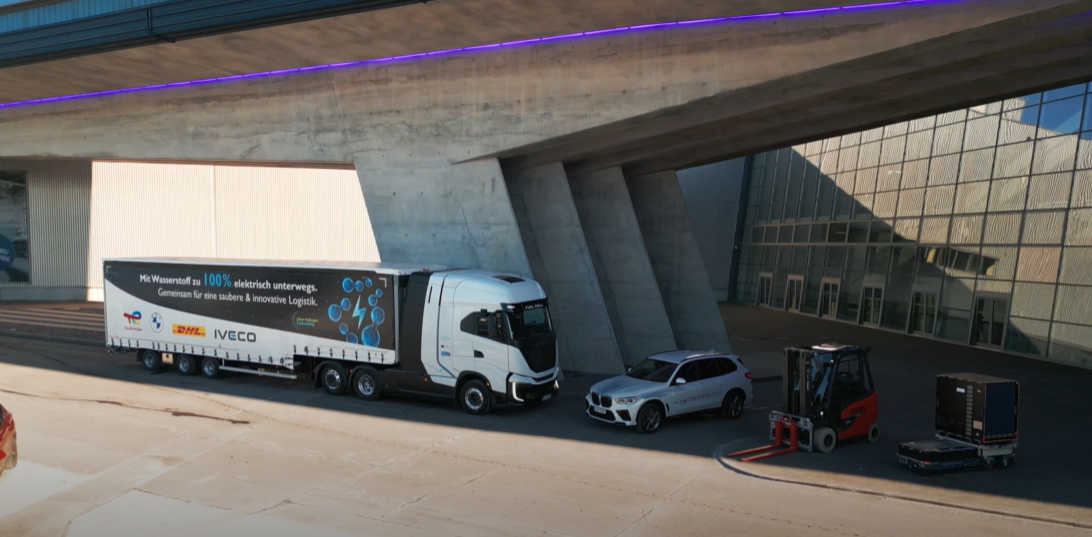The BMW Group has launched a hydrogen fuel cell truck pilot project as part of the European H2Haul initiative, advancing hydrogen-powered freight transport. The company has acquired two zero-emission fuel cell trucks, which will operate on routes between Leipzig, Landsberg, and Nuremberg. To support continuous operation, two new hydrogen refueling stations are being built in Leipzig and Hormersdorf, enabling fast refueling with large hydrogen volumes—critical for logistics efficiency. The initiative is being implemented in collaboration with IVECO, DHL, and TEAL Mobility.
“For the first time, hydrogen-powered trucks will be used in serial operation for German automobile production. This marks an important milestone as we gain real-world experience and advance this crucial technology,” said Michael Nikolaides, Head of Production Network and Logistics at BMW Group.
Hydrogen Trucks to Support European Decarbonization Efforts
The H2Haul project, funded by the Clean Hydrogen Partnership, aims to test fuel cell trucks under real-world conditions and evaluate their role in decarbonizing heavy transport. Sixteen trucks will be deployed across Europe, including two IVECO S-eWay Fuel Cell trucks operated by BMW Group Logistics in Germany.
Hydrogen-powered trucks offer key advantages such as short refueling times, extended range, and logistical flexibility without requiring a widespread charging infrastructure. This complements the BMW Group’s existing fleet of battery-electric trucks by covering long-haul routes.
BMW Group’s Hydrogen Strategy for Sustainable Logistics
The BMW Group Strategy for Reduced Logistics Emissions includes various hydrogen initiatives. The company is also involved in the HyCET project, testing H₂ combustion engine trucks alongside fuel cell vehicles. As part of HyCET, two 40-ton and one 18-ton trucks will be integrated into BMW’s logistics operations. This project, funded by Germany’s Federal Ministry for Digital and Transport (BMDV), is supported by partners including DHL, Volvo Trucks, Deutz, KEYOU, and TotalEnergies.
By simultaneously testing fuel cell and H₂ combustion trucks, BMW is evaluating the best applications for each technology. While fuel cell trucks offer higher efficiency, H₂ combustion engines have lower production costs due to their similarity to diesel engines. Both types will operate on the same logistics routes and refuel at shared hydrogen stations.
Hydrogen in BMW’s Leipzig Operations
The BMW Plant Leipzig has been a pioneer in hydrogen logistics since 2013, when it opened Germany’s first indoor hydrogen refueling station. Today, the plant operates one of Europe’s largest fuel cell-powered industrial fleets, with over 200 hydrogen forklifts and tugger trains. The site features five hydrogen stations, including one with fully automated refueling.
Additionally, BMW Leipzig is the first automotive plant to use hydrogen-powered burners in its paint shop. Five bivalent burners, capable of running on both hydrogen and natural gas, are already in use for painting the MINI Countryman’s contrast roof. As more burners are converted, the facility aims to eliminate natural gas use entirely, making it a leader in sustainable manufacturing.
Future Hydrogen-Powered BMW Production Models
Following the successful global testing of the BMW iX5 Hydrogen pilot fleet, the company plans to begin series production of hydrogen-powered vehicles in 2028. These models will be integrated into BMW’s existing lineup, offering customers an alternative hydrogen fuel cell drivetrain alongside battery-electric (BEV), plug-in hybrid (PHEV), and internal combustion engine (ICE) options.
“Our vision for Leipzig is the extensive decarbonization of production, including replacing fossil fuels with hydrogen,” said Petra Peterhänsel, Head of BMW Plant Leipzig.
Through these initiatives, BMW continues to drive forward the adoption of hydrogen in logistics and manufacturing, reinforcing its commitment to sustainable mobility and industrial decarbonization.



